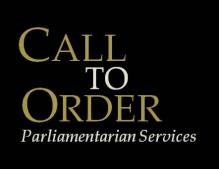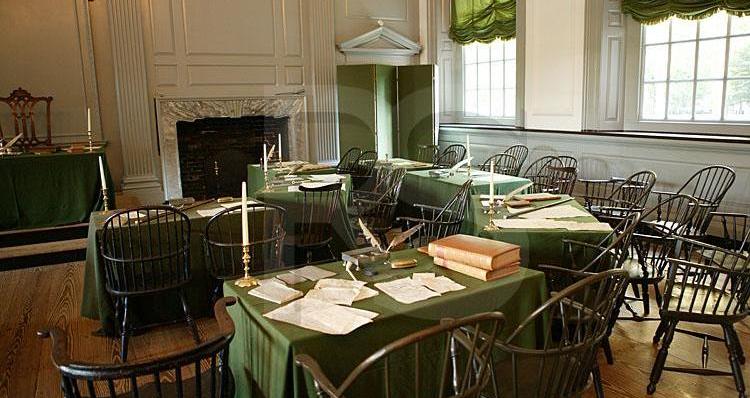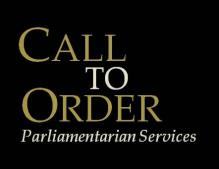In Mr. Smith Goes to Washington, the naïve Mr. Smith yields the Senate floor out of courtesy to a colleague, In doing so he loses his ability to debate on his legislation to prevent graft and corruption, Mr. Smith learned the hard way about the importance of knowing procedural rules. Officers and members of boards and and associations need to know the rules of order to achieve their goals and help their enterprises succeed. Our expertise includes:
- Meeting and Session Governance Services
- Presiding Officer Services
- Delegate Convention or Assembly Services
- Strategic Procedural Planning Services
- Bylaw Drafting, Review, and Revision Services
- Written Opinions Services
- Training Programs
Call out the sheriff! Legislators on the lamb!
Madison, WI -- Wisconsin Republican Governor Scott Walker needs to balance the budget, and he wants to do it by cutting spending and eliminating certain collective bargaining procedures of various government unions. His budget bill is being taken up by the Wisconsin State Senate where Republicans hold the majority of 19 to 14. But, fiscal bills require a quorum of three-fifths (60%) of the Senate members or 19.8 rounded to 20. Democrats have fled the state of Wisconsin to prevent a vote from being taken that they know they will lose.
The State Republican Senator Scott Fitzgerald made a motion for a call of the Senate. The motion for a call of the house in general parliamentary procedure requires, if adopted, the Sergeant at Arms lock to the doors of the assembly, after which a roll call is taken to find out who is present and more importantly who is absent without excuse. Those who are absent without excuse can be arrested and brought to the assembly. Generally, legislative bodies are the only types of assemblies that have the power to enforce a motion for a call of the the house. The Wisconsin State Senate has this authority. So now, 14 Democrat Senators are on the lamb and generally believed to be in Illinois.
The last time I can remember this happening was in Texas in 2004 when the Texas legislature was about to take a vote on the redistricting plan put together by the Republican controlled legislature. The Democrat members of the Texas legislature fled to Louisiana to prevent a quorum from being present and thereby stalling the plan from being implemented. (Needless to say, if the plan were implemented Democrats stood to lose some seats.) The Texas Rangers gathered up a posse to round up the fleeing legislators. You can't help but chuckle at the thought of a posse of Texas Rangers on horses chasing down those delinquent legislators!
The mere fact that a motion for a call of the house exists says something about us humans and the lengths that we're willing to go to have our way. Back at our nation's founding, one of the charges against King George in the Declaration of Independence was that "HE has called together Legislative Bodies at Places unusual, uncomfortable, and distant from the Depository of their public Records, for the sole Purpose of fatiguing them into Compliance with his Measures." Of course this was considered unfair. I wonder what the founders would say of the actions of either of the Wisconsin Democrats or the Texas Democrats?

© 2011 - 2014 Call To Order Parlimentarian Services
In the News
Independence Hall, Philadelphia,PA is where the Second Continental Congress debated and passed the Declaration of Independence, and where the Constitutional Convention debated and adoped the U.S. Constitution.

| Join Our Mailing List |
In Mr. Smith Goes to Washington, the naïve Mr. Smith yields the Senate floor out of courtesy to a colleague, In doing so he loses his ability to debate on his legislation to prevent graft and corruption, Mr. Smith learned the hard way about the importance of knowing procedural rules. Officers and members of boards and and associations need to know the rules of order to achieve their goals and help their enterprises succeed. Our expertise includes:
- Meeting and Session Governance Services
- Presiding Officer Services
- Delegate Convention or Assembly Services
- Strategic Procedural Planning Services
- Bylaw Drafting, Review, and Revision Services
- Written Opinions Services
- Training Programs
15% Rules leads Republicans to Court; Raises questions on abstentions
The Massachusetts Republican Convention has unearthed, to its dismay, an issue associated with abstentions by the use of the 15% rule. The controversy has landed in court with Mark Fisher seeking to overturn the Convention’s decision declaring him ineligible to face Charlie Baker in the primary election for the Republican nomination for Governor.
According to the Rules of the Republican Convention, Mr. Fisher needed 15% of the votes of delegates at the convention to challenge the endorsed candidate, Charlie Baker. Delegates were given the choice of voting for Charlie Baker, Mark Fisher, or “blank.” Blank votes were counted in the total vote count. Baker received 2,095, Fisher received 374, and there were 64 blanks.
The Chairman of the State Republican Party had decided in advance of the Convention to count the blanks, so the total number of votes was 2,533 with Mr. Fisher falling just shy of the 15% with 14.77% of the vote. If the blanks are excluded from the total, then delegates cast 2,469 and Mr. Fisher obtained more than the 15% with 15.15%. With his ability to challenge Mr. Baker in the primary hanging on counting blanks or not, Mr. Fisher has chosen to challenge the decision to count the ballots.
So, should the blanks be counted?
The ultimate question centers on how a delegate may abstain from voting. The Convention Rules rely on two foundations for decisions about details. Robert’s Rules of Order Newly Revised and Rule 11. As it relates to voting, Robert’s Rules maintains the right of an individual to abstain from voting and abstentions do not count in the total number of votes cast because in the standard case of two candidates running for election, an abstention or blank vote has no impact on the outcome.
In the presence of the 15% rule, however, an abstention favors a candidate in achieving the 15% as the case of Mr. Fisher demonstrates. Rule 11 gives the Chairman the ability to determine the method and order of voting for each vote or election during the Convention. Realizing the bias in an abstention, the Chairman decided to count blanks in the total votes cast. This allowed a delegate who did not support either candidate and did not want Mr. Fisher in the primary the ability to vote in such a way that reflected that preference.
Robert’s Rules is no longer applicable because a specific rule takes precedence over the general rules of Robert’s Rules. That is, the Convention Rules through Rule 11 gives the Chairman the ability to develop the methods of each vote. The Chairman’s decision under Rule 11 to count the blank votes, trumps Robert’s Rules.
As to Mr. Fisher’s appeal to the courts, time will tell.

In the News
Independence Hall, Philadelphia,PA is where the Second Continental Congress debated and passed the Declaration of Independence, and where the Constitutional Convention debated and adoped the U.S. Constitution.
